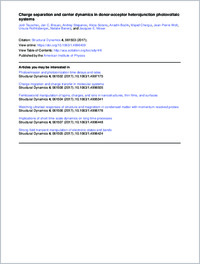Charge separation and carrier dynamics in donor-acceptor heterojunction photovoltaic systems
- Teuscher, Joël Photochemical Dynamics Group, Institute of Chemical Sciences and Engineering, EPFL, Lausanne, Switzerland - Lausanne Centre for Ultrafast Science (LACUS), EPFL, Lausanne, Switzerland
- Brauer, Jan C. FemtoMat Group, Department of Chemistry, Université de Fribourg, Switzerland
- Stepanov, Andrey GAP-Biophotonics Group, Department of Applied Physics, Université de Gen?ve, Switzerland
- Solano, Alicia Lausanne Centre for Ultrafast Science (LACUS), EPFL, Lausanne, Switzerland - Laboratory of Computational Chemistry and Biochemistry, Institute of Chemical Sciences and Engineering, EPFL, Lausanne, Switzerland
- Boziki, Ariadni Lausanne Centre for Ultrafast Science (LACUS), EPFL, Lausanne, Switzerland - Laboratory of Computational Chemistry and Biochemistry, Institute of Chemical Sciences and Engineering, EPFL, Lausanne, Switzerland
- Chergui, Majed Lausanne Centre for Ultrafast Science (LACUS), EPFL, Lausanne, Switzerland - Laboratory of Ultrafast Spectroscopy, Institute of Chemical Sciences and Engineering, EPFL, Lausanne, Switzerland
- Wolf, Jean-Pierre GAP-Biophotonics Group, Department of Applied Physics, Université de Gen?ve, Switzerland
- Rothlisberger, Ursula Lausanne Centre for Ultrafast Science (LACUS), EPFL, Lausanne, Switzerland - Laboratory of Computational Chemistry and Biochemistry, Institute of Chemical Sciences and Engineering, EPFL, Lausanne, Switzerland
- Banerji, Natalie FemtoMat Group, Department of Chemistry, Université de Fribourg, Switzerland
- Moser, Jacques-E. Photochemical Dynamics Group, Institute of Chemical Sciences and Engineering, EPFL, Lausanne, Switzerland - Lausanne Centre for Ultrafast Science (LACUS), EPFL, Lausanne, Switzerland
-
01.11.2017
Published in:
- Structural Dynamics. - 2017, vol. 4, no. 6, p. 061503
English
Electron transfer and subsequent charge separation across donor-acceptor heterojunctions remain the most important areas of study in the field of third- generation photovoltaics. In this context, it is particularly important to unravel the dynamics of individual ultrafast processes (such as photoinduced electron transfer, carrier trapping and association, and energy transfer and relaxation), which prevail in materials and at their interfaces. In the frame of the National Center of Competence in Research “Molecular Ultrafast Science and Technology,” a research instrument of the Swiss National Science Foundation, several groups active in the field of ultrafast science in Switzerland have applied a number of complementary experimental techniques and computational simulation tools to scrutinize these critical photophysical phenomena. Structural, electronic, and transport properties of the materials and the detailed mechanisms of photoinduced charge separation in dye- sensitized solar cells, conjugated polymer- and small molecule-based organic photovoltaics, and high-efficiency lead halide perovskite solar energy converters have been scrutinized. Results yielded more than thirty research articles, an overview of which is provided here.
- Faculty
- Faculté des sciences et de médecine
- Department
- Département de Chimie
- Language
-
- English
- Classification
- Chemistry
- License
-
License undefined
- Identifiers
-
- RERO DOC 306715
- DOI 10.1063/1.4996409
- Persistent URL
- https://folia.unifr.ch/unifr/documents/306242
Statistics
Document views: 102
File downloads:
- pdf: 143
